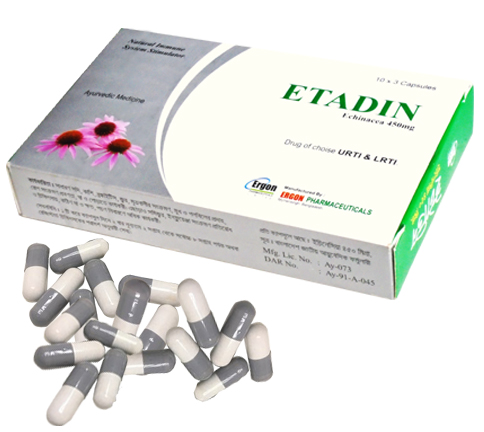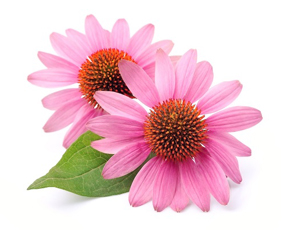
Composition :
Each Capsule contains-Indications :
Dosage & administration :
1 - 2 capsules One - two times daily or as advised by the registered physician.Adverse effects :
Some side effects have been reported such as fever, nausea, vomiting, bad taste, stomach pain, diarrhea, sore throat, dry mouth, headache, numbness of the tongue, dizziness, difficulty sleeping, a disoriented feeling, and joint and muscle aches.Contraindications :
Individuals with an increased tendency to have allergies, especially allergies to members of the family Asteraceae including arnica (Arnica spp.) flower, chamomile (Matricaria spp.) flower, marigold (Calendula officinalis L.) flower, yarrow (Achillea spp.) flower, ragweed (Ambrosia spp.), asters (Ast tataricus) and chrysanthemum (Chrysanthemum spp.).Drug interactions :
There are no verifiable reports of drug–herb interactions with any Echinacea product.Pregnancy & lactation :
There's not enough data to completely rule out risk for Echinacea during pregnancy (For safety reasons, few studies test these products in human pregnancies).
Echinacea is generally considered to be safe for nursing mothers. You should be careful to only purchase echinacea from a reputable manufacturer and only as a single herb preparation.
Specification :
Others information :

Echinacea Flower
The center of the flower has a seed head (cone), which is also spiky and dark brown to red in color. Three species of Echinacea are used as herbal remedies:
Pharmacology
Echinacea purpurea herb (i.e., aerial parts) and root both contain caffeic acid derivatives (0.6 - 2.1% in roots), including mainly cichoric acid (1.2 - 3.1% in the flowers), caffeic acid, caftaric acid, chlorogenic acid and 0.001 - 0.04% alkamides. E. purpurea herb also contains water-soluble polysaccharides, fructans, 0.48% flavonoids of quercetin and kaempferol type and 0.08 - 0.32% essential oil.
How it works
Echinacea has a complex mix of active substances, some of which are said to be antimicrobial, while others are believed to have an effect on the human immune system.
All species of this herbal remedy have compounds called phenols. Many plants contain phenols, active substances that control the activity of a range of enzymes and cell receptors, and protect the plant from infections and ultraviolet (UV) radiation damage. Phenols have antioxidant properties, which may be good for human health.
Echinacea also contains alkylamides or alkamides, (not in Echinacea pallida), which have an effect on the immune system, as well as polysaccharides, glycoproteins, and caffeic acid derivatives.
Mechanism of action
REFERENCE-
1) https://www.medicalnewstoday.com/articles/252684.php2) https://onlinelibrary.wiley.com/doi/abs/10.1002/mnfr.200700113


